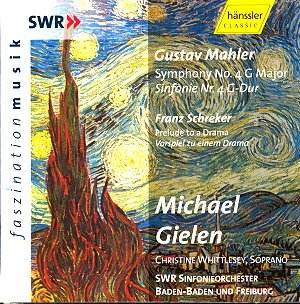Mahler's Fourth is a strange symphony, inspired
by the possibilities of a song deriving from a traditional folk
poem, about the journey of a child's soul to Heaven. Not only
does the song provide the germination from which the symphony
derives, in its totality it is the finale of the symphony.
Of all Mahler's symphonies this one probably
makes the best introduction for the newcomer to his uniquely compelling
musical experience. However, there are special demands upon the
performers, above all from the subtleties of phrasing and rubato
which abound in the first movement especially. Gielen proves himself
equal to these challenges, and his orchestra follows him admirably,
as do the engineers in achieving a spacious and atmospheric acoustic
in which detail remains impressive.
As the music proceeds, so these positive impressions
continue. The orchestra leader plays his second movement solo
with aplomb, and the woodwind players add strongly characterised
contributions in abundance. The string lines in the beautiful
slow movement could hardly be more eloquent. The great climax
which Mahler described as 'the Opening of the Gates of Heaven'
makes a powerful impression, as the timpani pound out the movement's
motto rhythm.
Then comes the finale, the lightest movement,
naïve in its charm, a solo song. However, while Christine
Whittlesey acquits herself well in her upper range, lower done
her tone is less than secure and her vibrato is too full to sound
comfortable in music whose naïve charm is its very essence.
Not for the first time, a recorded performance of Mahler's Fourth
falls at the hurdle of the finale. The performance of this movement
requires some tolerance, and while there is no doubting the artistry
and talent of those involved in a competitive market-place better
options are available. For example, try Lucia Popp with the LPO
and Klaus Tennstedt (EMI).
Hänssler's nicely produced package does
include a bonus, in the form of Franz Schreker's tone poem Overture
to a Drama. This makes an interesting additional item, well
played and beautifully recorded, even more than the Mahler, in
fact. The famous musicologist and commentator Theodor Adorno once
commented that 'the Prelude to Schreker's opera Die Gezeichneten
(The Marked Ones) is the quintessence of his entire output'.
If that is so, then this recorded performance of this twenty-minute
long piece serves the composer's cause well, and is as fine a
Schreker performance as the current catalogue contains. The committed
playing and the richly atmospheric recording play a full part
in allowing the music to make a strong impression.
Terry Barfoot
